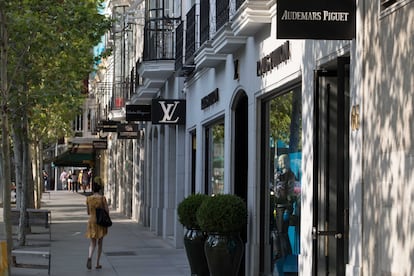Coronavirus crisis spells ruin for Madrid’s ‘Golden Mile’
The lack of foreign tourists, particularly from Asia, is devastating the luxury fashion strip in the Spanish capital

Shopping is practically a religion on streets like Serrano and Ortega y Gasset on Madrid’s so-called “Golden Mile,” an area in the upmarket Salamanca district that is home to stylish boutiques and exclusive brands.
Most of the shop assistants on this high-end shopping strip speak English, Mandarin and Spanish. Some stores offer water and even champagne to customers as they walk through the door. Usually, these customers are from Asia and Latin America. But with the Covid-19 pandemic, everything has changed – the rich are also afraid.
It’s as though it’s bad taste to show off wealth in times of crisisLucía Sainz de Santamaría, patron in Salamanca
Luxury shoppers no longer parade down Serrano street laden with shopping bags. The lines outside Chanel and Pandora Jewelry have vanished.
“We could have closed at 6pm,” says one member of staff at Pandora, which is known for its charm bracelets and designer rings. “I’m actually bored and we were always run off our feet before [the pandemic] because we couldn’t keep up with demand. No one comes in, not even to look, much less to buy. People from [Spain] think that because this is Serrano, it’s more expensive and they don’t even bother coming.”
Lucía Sainz de Santamaría is having a glass of red wine on the sidewalk cafe of Bodega La Lavinia, which gives her a perfect view of Valentino and Celine, two luxury bag stores. “I always sit at this table because I love to see all the women come and go with their shopping bags, but now there’s no one,” she says. “It’s as though it’s bad taste to show off wealth in times of crisis.”
A stroll through the Salamanca district means passing the luxury shops of fashion brands Chanel and Dior, whose factories in France, Italy and Switzerland have stopped production; Armani, whose centers in the north of Italy closed at the end of February; Spanish jewelers Tous, who have put most of their 4,000 employees on the government’s ERTE furlough scheme; and Burberry, which is facing a 50% drop in turnover.
Luciano Ochoa, the director of Innova TaxFree, a company that specializes in tax refunds for foreign tourists, explains that although local commerce is improving, the luxury market has not. “The Fitur international tourism fair gave very promising Asian tourism forecasts with a 50% increase in demand until 2025; now it seems like some stores might have to close,” says Ochoa, who is also a board member of Salamanca’s District 41.
Madrid is not a beach destination; instead it attracts cultural, gastronomic and retail tourism, which has a more exclusive public. “People come here to spend,” says Ochoa.
But the coronavirus crisis is keeping these tourists away. And for now, at least, Madrid’s Golden Mile has lost its sheen.
English version by Heather Galloway.
Tu suscripción se está usando en otro dispositivo
¿Quieres añadir otro usuario a tu suscripción?
Si continúas leyendo en este dispositivo, no se podrá leer en el otro.
FlechaTu suscripción se está usando en otro dispositivo y solo puedes acceder a EL PAÍS desde un dispositivo a la vez.
Si quieres compartir tu cuenta, cambia tu suscripción a la modalidad Premium, así podrás añadir otro usuario. Cada uno accederá con su propia cuenta de email, lo que os permitirá personalizar vuestra experiencia en EL PAÍS.
¿Tienes una suscripción de empresa? Accede aquí para contratar más cuentas.
En el caso de no saber quién está usando tu cuenta, te recomendamos cambiar tu contraseña aquí.
Si decides continuar compartiendo tu cuenta, este mensaje se mostrará en tu dispositivo y en el de la otra persona que está usando tu cuenta de forma indefinida, afectando a tu experiencia de lectura. Puedes consultar aquí los términos y condiciones de la suscripción digital.









































